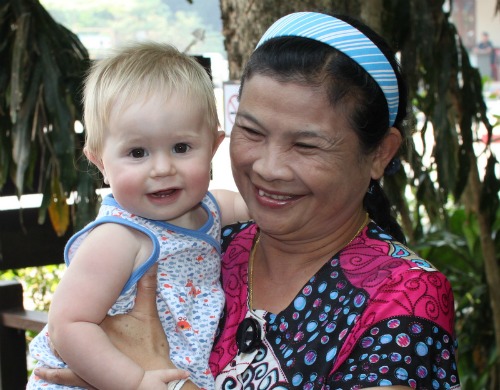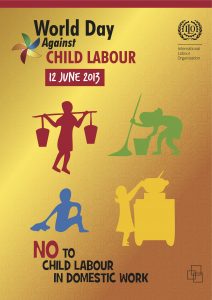
by Roxanne (USA) | Jun 21, 2013 | 2013, Childhood, Education, Kids, Milestones, Motherhood, Parenting, Preschool, Rox is Brilliant, School, Unintentionally Brilliant, USA, World Moms Blog, World Motherhood, Younger Children
 Earlier this month I attended my son’s graduation ceremony. He looked so handsome in his bright red cap and gown, smiling proudly at all he has accomplished. He clutched his little blue diploma when they called his name, and I was overcome with emotions that felt out of place. Especially considering the fact that my son had just finished Kindergarten.
Earlier this month I attended my son’s graduation ceremony. He looked so handsome in his bright red cap and gown, smiling proudly at all he has accomplished. He clutched his little blue diploma when they called his name, and I was overcome with emotions that felt out of place. Especially considering the fact that my son had just finished Kindergarten.
Literally. (more…)
Roxanne is a single mother to a 9-year-old superhero (who was born 7 weeks premature), living in the biggest little city and blogging all about her journey at Unintentionally Brilliant. She works as a Program Coordinator for the NevadaTeach program at the University of Nevada, Reno. Roxanne has a B.A. in English from Sierra Nevada College. She has about 5 novels in progress and dreams about completing one before her son goes to high school.
More Posts - Website
Follow Me:



by Veena Davis (Singapore) | Jun 20, 2013 | Family, Home, Husband, Parenting, Singapore, World Moms Blog, World Motherhood
 We continue honoring the fathers out there, even after Father’s Day! Today, Veena writes about her thoughts on the roles of fathers, and their unique hallmarks.
We continue honoring the fathers out there, even after Father’s Day! Today, Veena writes about her thoughts on the roles of fathers, and their unique hallmarks.
Motherhood and Mother’s Day are celebrated the world over – but how much does the world really realise a father’s sacrifices for his family?
According to Merriam-Webster, a father is :
fa·ther (fä

 r)
r)
n.
a. A male person whose sperm unites with an egg, resulting in the conception of a child.
b. A man who adopts a child.
c. A man who raises a child.
As mothers, we all know the amount of work involved in raising a child. So, how many of you would agree to the first definition of a father – sperm uniting with an egg? Or even the second?
A father – in the truest sense of the word – is one who begets a child and stands up for the mother and child through thick and thin. He is there during the sunny times and rainy days, during happiness and sorrow. And through sickness and health.
I am a full-time working mother – made possible only with the complete support of my husband. When I have to travel on business trips, or stay late at office, he is there for my Li’l One.
India (where I am from) is a patriarchal society with the men taking the upper hand in most spheres of life and work. When a girl gets married, she is usually expected to resign if her husband (or his family) doesn’t want her to work (often with no regard to her wish to continue working), she may have to move to a new city if her husband is located there, and more often than not, she is expected to give up her job once she has a kid. Or if the husband gets a posting abroad, the wife just has to drop everything and follow him there.
Sometimes when I go home, there are relatives who look askance when I say I have to attend a call or a meeting, or that I have no time for some thing. According to some of them, I should be devoting more time to womanly pursuits – like cooking, attending Church or some such activity.
This is quite funny, because my paternal Grandfather was a person who believed in a girl’s right to education and managed to get all 3 of his daughters educated and in government jobs. And he had just 2 granddaughters (me and a cousin) from a brood of 10 grand-kids, and both of us are full-time working mothers. Needless to say, none of the women who married into the family are working outside the house (for various reasons).
I have nothing against home makers – my Mother is one herself – and I am eternally thankful to her for her decision to stay home and look after us. All I am saying is that no one has any right to judge whether a woman should work or not, and decide what should be her priorities in life.
Now, I have a tremendous opportunity to move to Singapore, and my husband is again there for me – completely supporting my decision, and ready to move over as a family – not heeding any unwanted voices that may whisper about the inappropriateness of a husband moving because of his wife’s work priorities.
So far, I have just seen a single friend who moved abroad because his wife was transferred there on a project. And here I am – honoured to have such a caring person as a partner. He is always there with a helping hand in the kitchen (one place I detest). He has a bad back, and yet refuses to let me carry the heavy stuff. Every time I am back from my business trips, he insists on driving over with Li’l One to the airport, so that I don’t have to worry about getting a cab late at night. And no matter how worn out he is, he always has a smile for Li’l One and me.
In fact, it is all there in the little things – the way he always slows down the car to allow a person to cross the road, or a car waiting at a U-turn to take the turn. Or the pains he has taken to win over my family, in spite of us having an intercaste marriage (a terrible taboo in India) and even after having been subtly snubbed by some of my extended family (something that could very well result in cutting ties with the wife’s family forever). Or even the times he has packed up the house during the umpteen moves we have had ( 6 in the last 7 years), and let me go to a friend’s place or my home (and yes, I offered to stay and do the packing, but he was insistent that I leave it all to him).
Here is a salute to Fathers all over the world!
What makes your partner the best in the world? How does he help you out in your day?
Veena has experienced living in different climes of Asia - born and brought up in the hot Middle East, and a native of India from the state known as God’s Own Country, she is currently based in the tropical city-state of Singapore. ⠀ ⠀ ⠀ ⠀ ⠀ ⠀ ⠀ ⠀ ⠀ ⠀ ⠀ ⠀ ⠀ ⠀ ⠀ ⠀ ⠀ ⠀ ⠀ ⠀ Several years ago, she came across World Moms Network (then World Moms Blog) soon after its launch, and was thrilled to become a contributor. She has a 11-year old son and a quadragenarian husband (although their ages might be inversed to see how they are with each other sometimes). ⠀ ⠀ ⠀ ⠀ ⠀ ⠀ ⠀ ⠀ ⠀ ⠀ ⠀ ⠀ ⠀ ⠀ ⠀ ⠀ ⠀ ⠀ ⠀ ⠀ ⠀ ⠀ ⠀ ⠀ ⠀ ⠀ ⠀ ⠀ ⠀ ⠀ ⠀ ⠀ ⠀ ⠀ ⠀ On a professional front, she works in the financial sector - just till she earns enough to commit to her dream job of full-time bibliophile. ⠀ ⠀ ⠀ ⠀ ⠀ ⠀ ⠀ ⠀ ⠀ ⠀ ⠀ ⠀ ⠀ ⠀ ⠀ ⠀ ⠀ ⠀ ⠀ ⠀ ⠀ ⠀ ⠀ You can also find Veena at her personal blog, Merry Musing. ⠀
More Posts - Website

by World Moms Blog | Jun 15, 2013 | Guest Post, World Mom Feature, World Motherhood
Today we have a special World Mom Feature post by Loren Braunohler in Bangkok, Thailand of Toddle Joy. If you would like to contribute a post and be featured on World Moms Blog, contact contribute2@[at]worldmomsblog[dot]com!

“In Asia, It’s a Fair-Haired Child’s World”
Whether I want to accept it or not, I’ve become Kris Jenner. Yes, if being a full-time mom and keeping up with my children’s schedules, meals, nap times, and need for love and attention wasn’t keeping me busy enough, I am now their “momager”. Quite by default, to be honest.
In the U.S., my children are just two more fair-haired toddlers bumbling down the grocery store aisle. There is no additional pomp and circumstance; no extra drama to add to the already chaotic toddler lifestyle. They are just themselves – Logan and Katelyn – growing up and doing typical toddler things – amidst a sea of other toddlers: some of whom look like them, some of whom look very different from them, thanks to America’s melting pot phenomenon.
But hop on a flight across the Pacific, and my two fair-haired children are received very differently. So differently, in fact, that it is striking. In Asia, they are rock stars.
They are mini-celebrities. They are novelties. And everyone, from the noodle soup guy on the street to the wealthy Mercedes-wielding apartment building owner, wants to get their hands on them. And kiss them. And squeeze them. And talk to them. And hold them. And show them off to their friends.
There is our daily walk to and from the grocery store, which should take about five minutes each way, but instead takes ten or fifteen because of friendly people on the street who want a chance to entertain my children. There are the constant photos, anywhere and everywhere really, taking pictures of my son ambling down the street with his sunglasses on or my daughter “helping” me shop at the Tuesday clothes market.
There are the restaurant servers who happily whisk my children away for a walk back to the kitchen to show them off to the chefs (bonus: mom and dad actually get to eat together for a minute or two). And there is the occasional passerby who videotapes my son as he indulges in a soft serve ice cream cone.
In the U.S., this kind of attention would be creepy to the point of suspect. In Thailand, however, it is 100 percent normal and accepted. In fact, to be completely honest, it would be odd if no one were paying attention to your fair-haired baby.
Although I had read about the attention that Caucasian children received in Southeast Asia, I was not prepared for the deluge of attention that would be lavished upon my children when we arrived. At first it was difficult – and at times onerous – for me to deal with, but after two years in Thailand, I have learned to appreciate and understand this unique cultural difference. Thai people really love children, and they really, really love to interact with Caucasian fair-haired children. We have had similar experiences when traveling in Hong Kong, Bali, and Cambodia.
If you plan to visit or make a move to Asia with your fair-haired children, be aware that this, too, will likely happen to you. And as a parent to newly-minted mini-celebs, you have to figure out how to manage the overwhelming amount of attention your children receive, how they deal with it, and above all, how you deal with it.
Do your children meet their new-found “fame” with laughter, confusion, fright, boredom, or all of the above? And what about you? How do you deal with strangers going gaga over your offspring? What about holding them? Photographing them? Videotaping them? Are you out of your comfort zone yet?
If I could offer you some tips, they would go something like this:
- Factor in more time to do, well, anything when you have your children out in public with you.
- Always, always be polite, even if you find the attention annoying or overwhelming.
- Learn to relax a little – you are in a new place and the rules are different.
- Don’t let it keep you from exploring the new things around you.
It took some time for us to get used to managing the attention Logan and Katelyn receive. There are days I wish we could walk down the street unnoticed and make it to our destination in record time. But for the most part, I am so thankful to be living in a part of the world where children are cherished, adored and loved – even if mostly for their novelty factor.
The constant personal interaction has shaped Logan and Katelyn into social and confident young people, and for this, I am eternally grateful. Our only concern at this point is how much of a dive our children’s egos will take when we move home. But that, my friend, is a bridge we will cross when we get there.
 This is an original post to World Moms Blog by Loren Braunohler in Thailand. Loren and her family moved to Bangkok in November 2010. A former U.S. diplomat who served in Mozambique, Venezuela, Sudan, Washington DC, and Thailand, Loren resigned from the U.S. Foreign Service in July 2011 to be a full-time mom to son Logan, now age two and a half, and daughter Katelyn, age eleven months. In 2012, Loren started Toddle Joy, an online blog and resource for expat parents of young children who are new to Bangkok.
This is an original post to World Moms Blog by Loren Braunohler in Thailand. Loren and her family moved to Bangkok in November 2010. A former U.S. diplomat who served in Mozambique, Venezuela, Sudan, Washington DC, and Thailand, Loren resigned from the U.S. Foreign Service in July 2011 to be a full-time mom to son Logan, now age two and a half, and daughter Katelyn, age eleven months. In 2012, Loren started Toddle Joy, an online blog and resource for expat parents of young children who are new to Bangkok.
Through her blog, she hopes to inform and inspire others about the joys of raising a toddler, both in general, and in a place like Thailand, where children are continuously adored and amazed by the world around them. Loren is also a freelance writer and has published pieces in Travel +Leisure (Southeast Asia) and Bangkok Mothers and Babies International (BAMBI) Magazine. On the web front, she regularly contributes to Expecting Expats.
Photo credits to Loren Braunohler.
World Moms Blog is an award winning website which writes from over 30 countries on the topics of motherhood, culture, human rights and social good. Over 70 international contributors share their stories from around the globe, bonded by the common thread of motherhood and wanting a better world for their children.
World Moms Blog was listed by Forbes Woman as one of the "Best 100 Websites for Women 2012 & 2013" and also called a "must read" by the NY Times Motherlode in 2013. Our Senior Editor in India, Purnima Ramakrishnan, was awarded the BlogHer International Activist Award in 2013.
More Posts

by Tina Santiago-Rodriguez (Philippines) | Jun 13, 2013 | Child Care, Husband, Parenting, Philippines, Tina Santiago-Rodriguez, Truly Rich Mom, World Moms Blog, World Motherhood
 I know some of you may not agree with the title of this post but humor me anyway. I’m writing this using my phone, while nursing and holding my seven-week-old daughter close to me, skin to skin. She’s been sick since birth, you see, and lost a significant amount of weight and is recovering from an infection. (The awesome ladies from my World Moms Blog family know in detail what’s been happening in my life lately and you folks who may be curious can get more details over at www.trulyrichmom.com.)
I know some of you may not agree with the title of this post but humor me anyway. I’m writing this using my phone, while nursing and holding my seven-week-old daughter close to me, skin to skin. She’s been sick since birth, you see, and lost a significant amount of weight and is recovering from an infection. (The awesome ladies from my World Moms Blog family know in detail what’s been happening in my life lately and you folks who may be curious can get more details over at www.trulyrichmom.com.)
Anyway, back to the post title. While many mothers may not be raising their children with their husbands or partners or their kids’ birth fathers (because of their circumstances and/or choices), for many of us, this is still the set-up we have: mom AND dad work together to bring up the kids and make sure they become productive citizens.
This is certainly true in my case, and because it is Father’s Day this weekend, I want to take this opportunity to thank all the “World Dads” out there who are committed to helping their wives or partners raise their children, including my own husband.
The past seven weeks with our now-recovering baby have been extra challenging and I don’t think I could have survived them without her father. Anthony has been a pillar of strength for me and although I know that deep down he has been worried over our little one too, he has never shown it, and has always reminded me that “all is well.” (more…)
Tina Santiago-Rodriguez is a wife and homeschool mom by vocation, a licensed
physical therapist by education and currently the managing editor of Mustard, a
Catholic children's magazine published by Shepherd's Voice
Publications in the Philippines, by profession. She has been writing
passionately since her primary school years in Brunei, and contributes
regularly to several Philippine and foreign-based online and print publications. She also does sideline editing and scriptwriting jobs, when she has the time. Find out more about Tina through her personal
blogs: Truly Rich Mom and Teacher Mama Tina.
More Posts

by Jennifer Prestholdt (USA) | Jun 11, 2013 | 2013, Human Rights, International, Morocco, World Moms Blog, World Voice

Photo by Jennifer Prestholdt
Hidden Child Labor
While millions of tourists visit Morocco every year, very few are aware of a hidden human rights abuse that is occurring behind closed doors in Morocco’s cities. Morocco has one of the worst child domestic labor problems in North Africa. The International Labour Organization (ILO) has estimated that between 66,000 and 88,000 children between the ages of 7 and 15 – 70% of whom are under age 12 – are working as domestic servants in Morocco.
These children work long hours for little pay and often suffer physical and other forms of abuse. Because domestic work is “women’s work” in Morocco, virtually all of these child domestic workers are girls. In Morocco (a country with a French colonial history), these child domestic workers are called petites bonnes or “little maids”.
I had the opportunity to learn more about the petites bonnes issue during a recent trip to Morocco. The United States Department of Labor’s Bureau of International Labor Affairs describes the problem like this:
Young girls are sent to work as live-in domestic servants, often before they reach age 10. Parents sell their daughters or receive payment of wages in exchange for their daughters’ service. These petites bonnes (little maids) often face conditions of involuntary servitude, including long hours without breaks; physical, verbal and sexual abuse; withheld wages and even restrictions on their movement. Frequently, they are sent from rural villages to more urban areas, and find it difficult to make their way home. Most petites bonnes are denied an education, and illiteracy rates are high among this population.
The Difficult Life of a Petite Bonne
The situation of petites bonnes in Morocco results from a combination of poverty, gender inequality, and lack of access to education. Girls – some as young as my own 8-year-old daughter – are sent to work as petites bonnes to generate income to support their families. They come from poor rural areas to work in cities such as Casablanca, Rabat, Marrakech, Tangiers, Agadir, and Fes. Intermediaries generally broker the arrangement, receiving a fee from the employer. Petites bonnes interviewed by Human Rights Watch reported that their employers frequently beat and verbally abused them, denied them the chance to go to school, and sometimes even refused to provide them with adequate food and sleeping facilities.
In a strange city, separated from their families and often speaking a Berber language instead of the Arabic spoken by a majority of Moroccans, many petites bonnes are extremely isolated and vulnerable. The isolation, along with the privacy of the homes, increases the chance of sexual abuse by male members of their employers’ household. In fact, several studies have found that many unwed young mothers in shelters in Morocco were petites bonnes when they became pregnant.
The difficult life of a petite bonne sometimes ends tragically. The widely reported story of little Khadija, an 11-year-old petite bonnewho was beaten to death by her employer in July 2011, raised calls for the government to take action on the issue. In January 2013, a 17 year old petite bonne in Casablanca attempted suicide by jumping from the fourth floor of her employers’ home. Amateur video of the suicide attempt that was circulated on the internet shocked Moroccans. Most recently, on March 24, 2013, a young domestic worker was taken to the hospital in Agadir with third degree burns on multiple parts of her body. Only 14 years old, she died from the injuries allegedly inflicted by her employers, prompting a UN representative in Morocco to decry child domestic labor by girls as “one of the worst forms of child exploitation” and call on the government to take action. Yet, thousands of petites bonnes in Morocco continue to suffer in silence.
Gaps in Legal Protection
According to NGOs working to help petites bonnes in Morocco, part of the problem relates to gaps in and difficulties with implementation of Moroccan laws. While Moroccan law prohibits employment of children under the age of 15, Morocco’s Labor Code does not apply to domestic work. Therefore, the Labor Codes’ protections for workers regarding hours worked (44 hours per week) and pay (2,333 dirhams or approximately $261 per month) do not apply. Human Rights Watch has documented that petites bonnes work long hours, often seven days a week. They earn an average of 545 dirhams (approximately $61) per month, but some earn as little as 100 dirhans (approximately $11).
In addition, Morocco ratified the Convention on the Rights of the Child (CRC) in 1993 and the ILO Convention No 182 on the Worst Forms of Child Labor. Both international treaties prohibit economic exploitation and employment of children in work that is likely to be hazardous, interfere with their education, or harm their health, safety or development. Unfortunately, neither have been implemented in a way that provides adequate protection to the petites bonnes.
Some Progress in Protecting Children
There is some indication that things are starting to change in Morocco. The government and international human rights organizations report that the number of girls working as petites bonnes is declining. This is due in part to the fact that public awareness about the problems faced by petites bonnes has been raised because of increased media attention to the issue and public education campaigns undertaken by the Moroccan government, NGOs, and United Nations agencies. The Moroccan government has also taken steps to increase school enrollment and this has helped reduce the number of children engaged in child labor.
Yet still more needs to be done. Since 2006, the government has been working on a draft law on domestic work that would for the first time establish a legal framework to better protect petites bonnes, secure rights such as a weekly day of rest and annual leave, and impose sanctions on employers. The Moroccan government has said that the draft Law on Domestic Workers is one of its priorities, but the bill has not yet been considered and passed by Parliament.
Take Action on June 12 – World Day Against Child Labour!
 The problem of child domestic workers is not unique to Morocco. In fact, there are an estimated 15.5 million child domestic workers worldwide. The widespread use of children as domestic servants is one of the most hidden forms of child labor.
The problem of child domestic workers is not unique to Morocco. In fact, there are an estimated 15.5 million child domestic workers worldwide. The widespread use of children as domestic servants is one of the most hidden forms of child labor.
The exploitation of children, particularly girl domestic workers like petites bonnes, is a serious violation of children’s rights. It perpetuates inequality and inter-generational poverty, and deprives girls of their right to education, health, participation and protection. It also prevents children from acquiring the life skills and education necessary to improve their future.
To draw attention to the issue of child labor, the United Nations has recognized June 12 as the World Day Against Child Labour. In 2013, the focus is on child domestic workers like the petites bonnes of Morocco. On the 2013 World Day Against Child Labour, the international community is calling for legislative and policy reforms to ensure the elimination of child labor in domestic work and the provision of decent work conditions and appropriate protection to young workers in domestic work who have reached the legal working age. In Morocco, the government should:
• Strictly enforce the minimum age of 15 for all employment (including domestic work) and ensure that all children (particularly girls) enjoy the right to free and compulsory basic education;
• Adopt a domestic worker law that ensures compliance with the 2011 ILO Convention 189 on decent work for domestic workers
• Create an effective system for identifying, removing and rehabilitating child domestic workers from illegal or abusive employment.
• Criminally prosecute individuals responsible for violence or other criminal offenses against child domestic workers.
In addition, the World Day Against Child Labour provides the opportunity for all of us to take action to build the worldwide movement against child labor.
Take Action to end child labor. Learn what you can do to inform yourself and raise awareness in your community. The ILO’sSCREAM (Supporting Children’s Rights through Education, the Arts and Media) programme has factsheets, presentations, postcards, poems, and more. The SCREAM education pack is available in multiple languages.
Join the 12to12 to End Child Labour community. Learn more about the issue and join the 12to12 Community Portal, which provides a common platform for experience and knowledge sharing on research, activities and events related to the World Day Against Child Labour.
Find out what kids and teens can do to help. The ILO’s Youth in Action against Child Labour campaign has ideas, information, videos and other resources to help young people take action to end child labor.
Make a pinwheel with your kids. The pinwheel has become the symbol of the international fight against child labor. The pinwheel campaign to raise awareness about child labor began in Brazil in 2004. The five blades of the pinwheel represent the different continents of the world and the wind that makes the pinwheel spin is the will to act and to pass on the message until all countries take adequate measures to end child labor. Download a kit to make a pinwheel to keep the movement going!
This is an original World Moms Blog post written by Jennifer Prestholdt.
Were you aware of the international child labor issue? Does it exist in the country in which you live?

Jennifer Prestholdt is a lawyer and the Deputy Director of The Advocates for Human Rights, a volunteer-based human rights organization that works locally, nationally and internationally. Her work in human rights takes her around the world, but she spends most of her time in Minneapolis, MN, where she lives with her children (two sons and one daughter), her husband, an elderly cat and a dwarf hamster.
As Jennifer’s kids are now all in school (1st, 4th and 6th grades), she is finally finding more time to do the things that she used to love to do, especially running, writing and knitting. Jennifer loves to travel and has had the dubious distinction of having been accidentally locked in a bathroom on five continents so far. Australia and Antarctica await!
In January 2011, Jennifer made a New Year’s Resolution to start writing about her experiences in order to share with her children the lessons learned from 15 years of work in human rights. The result is her personal blog, The Human Rights Warrior. The name comes from her son Simon, who was extremely disappointed to learn that his mother is a lawyer, not a warrior.
You can find her on her blog The Human Rights Warrior or on Twitter @Jprestholdt.
More Posts

by Martine de Luna (Philippines) | Jun 6, 2013 | Health, Motherhood, World Moms Blog, World Motherhood

I created this graphic for my blog. I thought it appropriate for this post, as I hope you’ll realize.
I have always played this parenting thing “by ear.” While I do read books, websites, and blogs about parenting, there’s just never anything out there that tackles my situation in a specific way. Of course, that’s to be expected! We all have different families; we all have different sets of issues to deal with in our families.
I recently had to deal with a “blow” to our family, in the form of sickness. It’s the end of the summer season here in Manila, and immediately after is a rainy, monsoon season. At this time of the year, flu and colds are rampant. Within two weeks (going three), each of us in the family were struck one-by-one with sickness, starting with my son, Vito.
Having a sick child when you’re a one-woman show running a business from home means that things are positioned to get crazy in a matter of hours. For me, it meant juggling work, child care, and household duties. (more…)
Martine is a work-at-home Mom and passionate blogger. A former expat kid, she has a soft spot for international efforts, like WMB. While she's not blogging, she's busy making words awesome for her clients, who avail of her marketing writing, website writing, and blog consulting services. Martine now resides in busy, sunny Manila, the Philippines, with her husband, Ton, and toddler son, Vito Sebastian. You can find her blogging at DaintyMom.com.
More Posts

 Earlier this month I attended my son’s graduation ceremony. He looked so handsome in his bright red cap and gown, smiling proudly at all he has accomplished. He clutched his little blue diploma when they called his name, and I was overcome with emotions that felt out of place. Especially considering the fact that my son had just finished Kindergarten.
Earlier this month I attended my son’s graduation ceremony. He looked so handsome in his bright red cap and gown, smiling proudly at all he has accomplished. He clutched his little blue diploma when they called his name, and I was overcome with emotions that felt out of place. Especially considering the fact that my son had just finished Kindergarten.



 We continue honoring the fathers out there, even after Father’s Day! Today, Veena writes about her thoughts on the roles of fathers, and their unique hallmarks.
We continue honoring the fathers out there, even after Father’s Day! Today, Veena writes about her thoughts on the roles of fathers, and their unique hallmarks. 

 This is an original post to World Moms Blog by Loren Braunohler in Thailand. Loren and her family moved to Bangkok in November 2010. A former U.S. diplomat who served in Mozambique, Venezuela, Sudan, Washington DC, and Thailand, Loren resigned from the U.S. Foreign Service in July 2011 to be a full-time mom to son Logan, now age two and a half, and daughter Katelyn, age eleven months. In 2012, Loren started
This is an original post to World Moms Blog by Loren Braunohler in Thailand. Loren and her family moved to Bangkok in November 2010. A former U.S. diplomat who served in Mozambique, Venezuela, Sudan, Washington DC, and Thailand, Loren resigned from the U.S. Foreign Service in July 2011 to be a full-time mom to son Logan, now age two and a half, and daughter Katelyn, age eleven months. In 2012, Loren started 
 I know some of you may not agree with the title of this post but humor me anyway. I’m writing this using my phone, while nursing and holding my seven-week-old daughter close to me, skin to skin. She’s been sick since birth, you see, and lost a significant amount of weight and is recovering from an infection. (The awesome ladies from my World Moms Blog family know in detail what’s been happening in my life lately and you folks who may be curious can get more details over at www.trulyrichmom.com.)
I know some of you may not agree with the title of this post but humor me anyway. I’m writing this using my phone, while nursing and holding my seven-week-old daughter close to me, skin to skin. She’s been sick since birth, you see, and lost a significant amount of weight and is recovering from an infection. (The awesome ladies from my World Moms Blog family know in detail what’s been happening in my life lately and you folks who may be curious can get more details over at www.trulyrichmom.com.)







